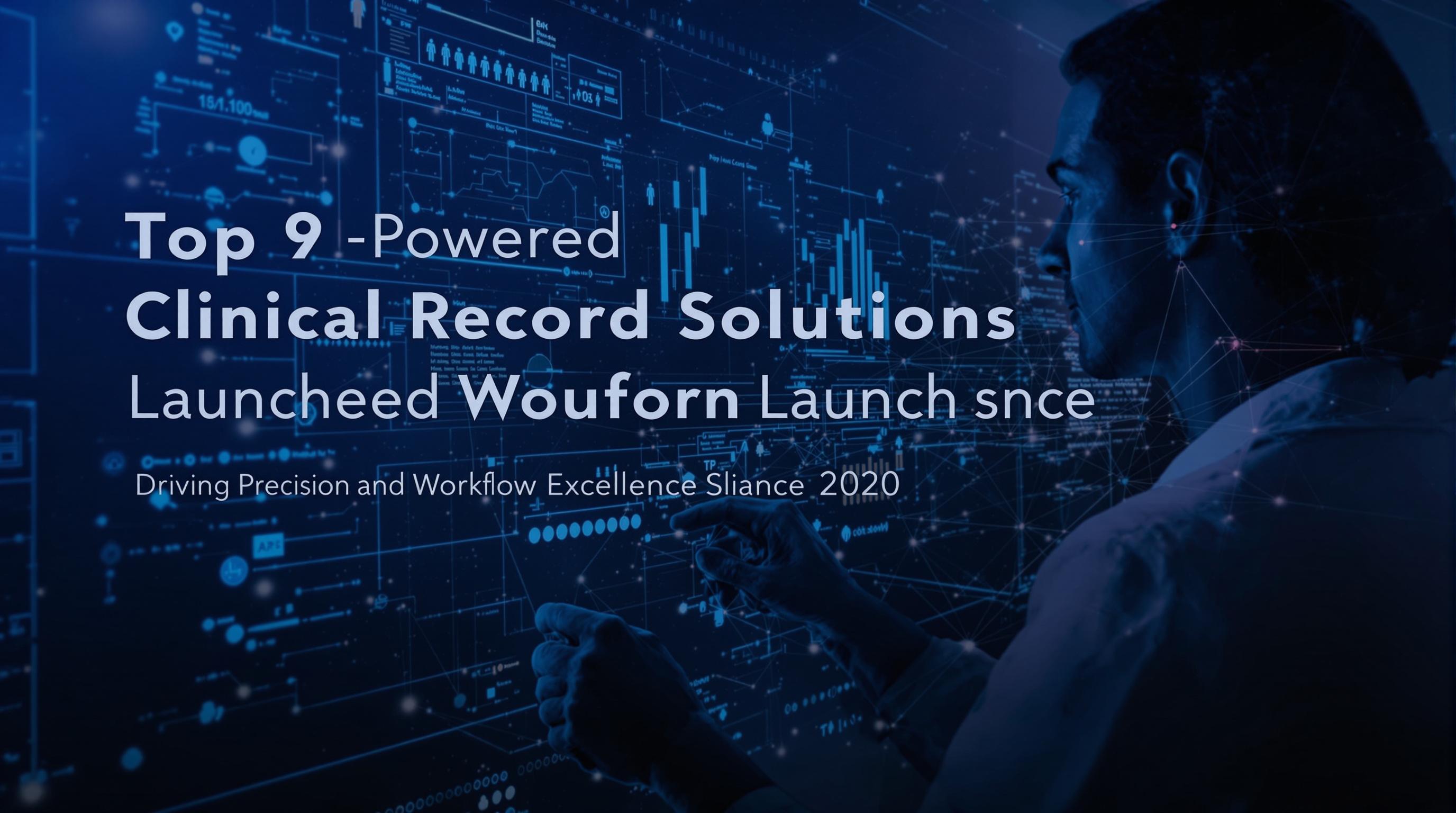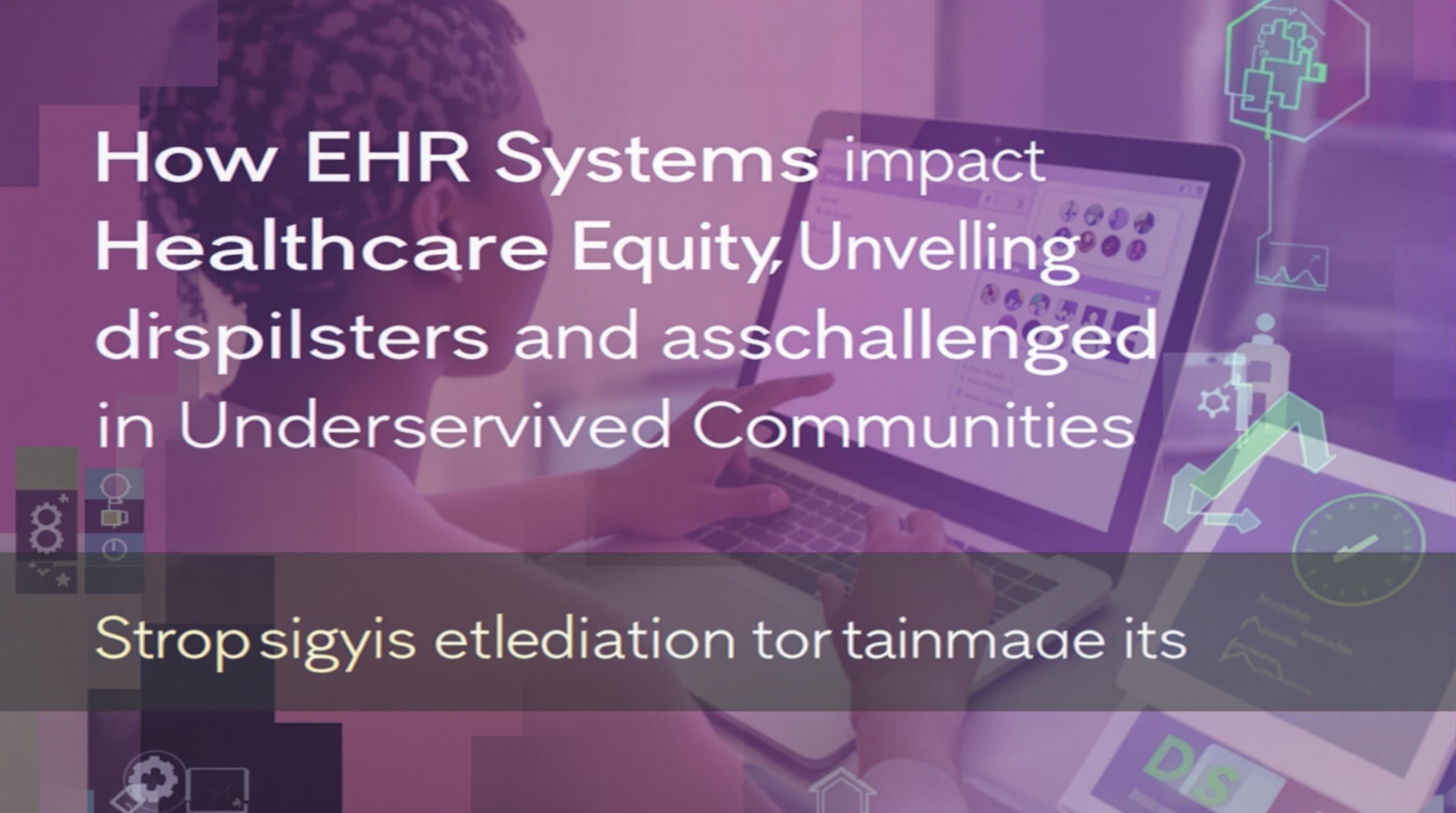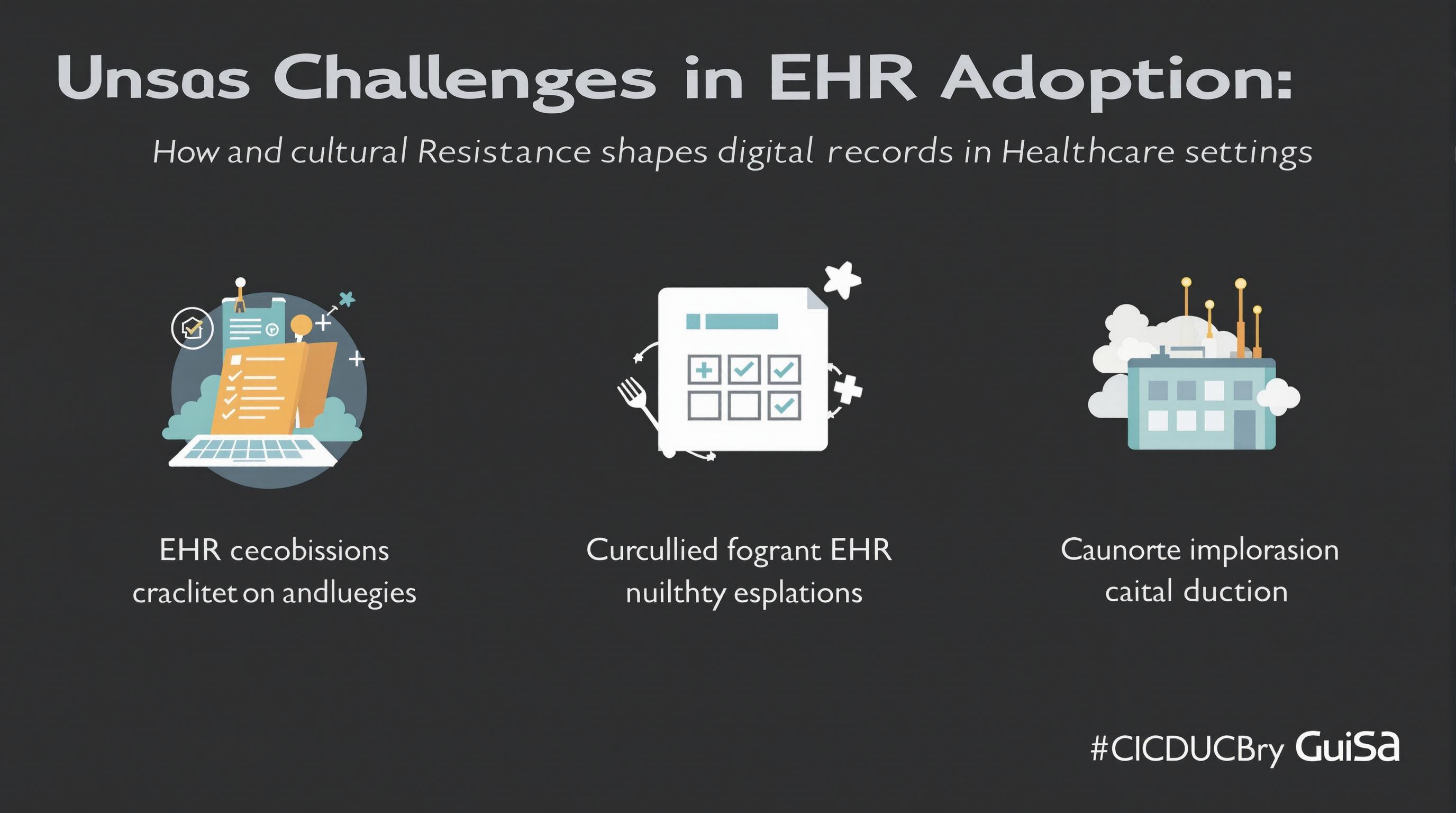Related Articles
- The Unexpected Impact of Environmental Factors on the Accuracy of Medication Dispensing Technologies
- Exploring the Influence of Mental Health Stigma on Accessibility and Affordability of Coverage in Modern Insurance Plans
- How Cloud Storage Quirks Are Quietly Complicating Patient Data Protection in Modern Healthcare Settings
- Top 6 Emerging Medical Billing Platforms Revolutionizing Practice Revenue Cycles Since 2019
- When Digital Distance Deepens Divide: Surprising Social Costs of Remote Health Services in Underserved Communities
- The Unexpected Role of EHR Usability in Physician Burnout and Strategies to Reclaim Workflow Balance
Top 9 AI-Powered Clinical Record Solutions Launched Since 2020 Driving Precision and Workflow Excellence
Top 9 AI-Powered Clinical Record Solutions Launched Since 2020 Driving Precision and Workflow Excellence
Top 9 AI-Powered Clinical Record Solutions Launched Since 2020 Driving Precision and Workflow Excellence
The healthcare industry has witnessed a transformative integration of artificial intelligence (AI) within clinical record systems since 2020. These AI-powered solutions are revolutionizing how patient data is recorded, analyzed, and utilized to improve precision medicine and streamline clinical workflows. By automating data entry, enhancing diagnostic accuracy, and enabling predictive analytics, these systems are enabling healthcare providers to deliver high-quality care more efficiently.
Advancements in natural language processing (NLP), machine learning, and data interoperability have accelerated the development and adoption of innovative clinical record solutions. This article reviews the top nine AI-powered clinical record platforms that have been launched since 2020, highlighting their unique features and impact on healthcare delivery. Understanding these tools provides insight into the future direction of medical informatics and patient management.
With pressure to reduce physician burnout and increase care precision, these tools represent critical investments in healthcare technology. Each solution emphasizes seamless integration with existing electronic health record (EHR) systems, robust data security, and user-centered design. The following sections detail each of these impactful AI clinical record systems shaping modern healthcare.
1. Epic Systems' Cognitive Clinical Documentation (2020)
Epic Systems introduced its Cognitive Clinical Documentation solution in 2020, integrating AI to automate documentation within the Epic EHR platform. The tool leverages advanced NLP to transcribe and summarize physician-patient conversations in real-time, reducing manual entry and enhancing note accuracy.
By automating clinical documentation, the solution alleviates administrative burdens, allowing clinicians to focus more on patient care. It also promotes consistency in records, which supports better longitudinal data analysis and clinical decision-making. Early adopters reported a significant reduction in documentation time and improved physician satisfaction.
Epic’s AI-powered system is HIPAA-compliant and supports multi-specialty customization, making it a versatile tool in various clinical settings. According to a 2021 study published in the Journal of American Medical Informatics Association, Cognitive Clinical Documentation improved data quality while lowering clinician burnout rates, exemplifying AI's positive role in healthcare efficiency.
2. Cerner's AI-Embedded EHR Enhancements (2021)
Cerner Corporation launched AI-embedded enhancements to their Millennium EHR platform in 2021. Their AI capabilities focus on predictive analytics, automated coding, and intelligent clinical decision support, all integrated within the clinical record workflow.
The system uses machine learning algorithms to analyze patient history and identify risk factors, supporting early intervention strategies. Its advanced coding automation reduces errors in billing and documentation, significantly accelerating reimbursement cycles. Additionally, Cerner’s AI highlights clinical care gaps and suggests evidence-based protocols at the point of care.
These features help clinicians make informed decisions quickly while managing vast amounts of patient data. Data from Health IT Analytics (2022) indicated that Cerner's AI integrations improved workflow efficiency by 25% and enhanced patient outcome tracking, underscoring the platform’s contribution to integrated healthcare delivery.
3. Google Health's AI-Powered Clinical Notes (2021)
Google Health unveiled its AI-powered clinical note system in 2021, leveraging deep learning to generate structured clinical documentation from unstructured patient conversations. The solution employs advanced speech recognition combined with contextual NLP to produce accurate and comprehensive notes.
Designed to integrate with multiple EHR systems, Google's tool reduces physician time spent on paperwork by automating note-taking during consultations. The solution also identifies key clinical data points, improving clinical data quality and enabling better population health analytics.
According to a 2022 article in Nature Digital Medicine, Google Health's AI-powered notes achieved high accuracy rates while maintaining patient privacy through encrypted processing methods. This positions the solution as a scalable approach to transform clinical documentation practices worldwide.
4. Nuance Dragon Medical One with AI Assistant (2020)
Nuance Communications enhanced their Dragon Medical One platform by integrating an AI medical assistant module in 2020. This AI assistant provides context-aware suggestions and auto-populating templates during clinical record entry to speed up documentation.
The platform employs voice recognition and AI-powered medical language understanding to help clinicians produce richer clinical notes with fewer errors. Its cloud-based deployment enables real-time updates and easy access across devices.
Studies have shown that Dragon Medical One’s AI assistant reduces documentation time by up to 40%, contributing to improved workflow satisfaction among healthcare providers. Furthermore, the system supports multiple specialties, making it widely adaptable.
5. AWS HealthLake Imaging with AI Integration (2021)
Amazon Web Services (AWS) launched HealthLake Imaging in 2021, an AI-integrated cloud solution designed to centralize and analyze medical imaging data within a clinical record framework. The service incorporates AI models to extract diagnostic information and metadata from images efficiently.
The AI algorithms assist radiologists by automating measurement, classification, and anomaly detection directly linked to patient records. This automation supports faster diagnosis and reduces manual image review workloads while linking diagnostic imaging data seamlessly with clinical narratives.
According to AWS Whitepapers (2022), HealthLake Imaging has improved diagnostic throughput and enhanced interoperability with other AI-enabled clinical records. Its compliance with HIPAA and FDA guidelines assures safety and privacy, promoting clinical workflow excellence in imaging-intensive specialties.
6. Microsoft Cloud for Healthcare's AI-Enhanced Records (2020)
In 2020, Microsoft launched its Cloud for Healthcare platform integrating AI capabilities directly into clinical records management. This solution emphasizes secure data sharing, AI-based patient risk stratification, and workflow automation tools.
The platform enables health providers to unify clinical and operational data with AI that identifies care gaps, predicts patient deterioration, and automates routine documentation tasks. Azure's machine learning tools further support customized clinical models adapted to specific institutional needs.
Independent analyses by HIMSS Analytics highlight gains in workflow speed and clinical decision accuracy after implementing Microsoft's AI-enhanced records. The system’s scalability and integration with Office 365 also promote collaboration among healthcare teams.
7. IBM Watson Health's Clinical Document AI (2022)
IBM Watson Health introduced its Clinical Document AI solution in 2022 to elevate clinical record accuracy and usability. Using sophisticated NLP and machine learning, the solution extracts actionable insights from unstructured clinical notes for downstream care applications.
It supports automated coding accuracy, clinical trial matching, and population health management by structuring data for analytics. The AI engine can identify patterns and suggest treatment protocols based on real-time evidence synthesis from clinical data.
Peer-reviewed outcomes reported in the Journal of Healthcare Informatics Research (2023) demonstrate Clinical Document AI's effectiveness in improving documentation completeness and enhancing clinical workflow. IBM's privacy-first architecture ensures compliance with global healthcare regulations.
8. Olive AI’s Intelligent Clinical Automation (2020)
Olive AI’s Intelligent Clinical Automation platform, released in 2020, focuses on AI-driven workflow orchestration within clinical record systems. Olive automates repetitive administrative tasks such as prior authorizations, data verification, and record reconciliation.
The AI bots work alongside EHR systems to reduce bottlenecks and improve data accuracy throughout patient care cycles. Olive’s platform integrates with many EHR vendors, facilitating widespread adoption and improved operational efficiency.
Case studies published by Olive Health (2021) show that hospitals reduce administrative errors by over 30% and free up hundreds of clinician hours monthly using this platform. This demonstrates how AI-powered automation drives substantial workflow improvements.
9. Suki AI Voice Assistant for Clinical Documentation (2021)
Suki AI launched its voice-enabled AI assistant in 2021 to streamline clinical documentation and enhance EHR usability. Suki uses conversational AI to capture physician notes, transforming voice commands into structured clinical records with high accuracy.
The assistant reduces typing demands, integrates with multiple EHR systems, and learns clinician preferences to customize workflows. Suki additionally provides analytics to monitor documentation efficiency and clinician adoption trends.
According to a survey by KLAS Research (2022), providers using Suki reported a 35% reduction in documentation time and increased time spent on patient interaction. These benefits highlight the role of voice AI in improving precision and clinician workflow.
Conclusion
Since 2020, AI-powered clinical record solutions have profoundly shaped the healthcare landscape by enhancing precision and streamlining workflows. The nine platforms highlighted showcase diverse approaches—from voice recognition and NLP to predictive analytics and automation—addressing key challenges in clinical documentation and data management.
Adoption of these AI-driven tools not only reduces clinician workload but also improves data integrity, enabling better patient outcomes and operational efficiencies. As AI technologies continue to evolve, their integration with clinical records will remain pivotal to advancing personalized and data-driven care.
Healthcare organizations aiming for excellence should carefully evaluate these innovative solutions based on their specific workflows and regulatory environments. Continued investment in AI-powered clinical record systems promises to usher in an era of precision medicine and healthcare delivery efficiency.




